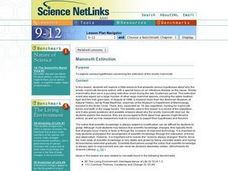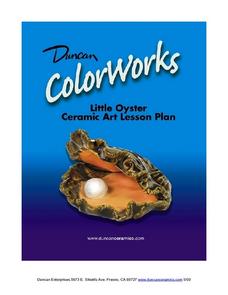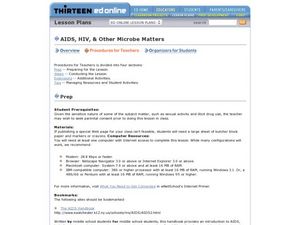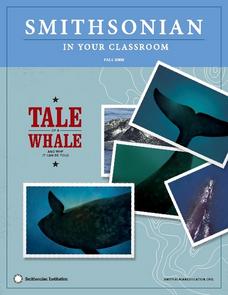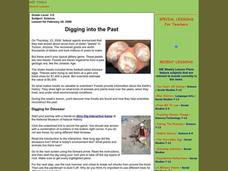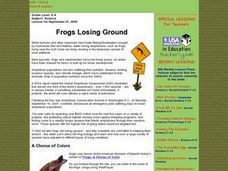University of Colorado
Space Travel Guide
Neptune takes 164.8 Earth years to travel around the sun. In the fifth of 22 lessons, young scientists create a travel guide to a planet in our solar system. They provide tips for others on what to bring, what they see, and their...
Curated OER
Spiritual Power of Symbols
Students examine how symbols are used in some societies to influence spirits and to protect rooms. They discuss and view examples of doors decorated with symbols, and create a door mural using African and American symbols.
Curated OER
Mammoth Extinction
High schoolers explore various hypotheses concerning the extinction of the woolly mammoth.
Curated OER
Butterfly 1: Observing the Life Cycle of a Butterfly
Students observe and identify the characteristics of the life cycle of a butterfly.
Curated OER
Little Oyster: Ceramic Lesson
Children will love researching and then creating a bottom dwelling mollusk of their own. They watch clips describing the ocean ecosystem and how oysters fit into their environment. Next, they research what oysters eat and how they look....
Curated OER
AIDS, HIV and other Microbe Matters
This series of lessons contains sensitive material. Please review to ensure that the content is suitable for your class. It begins by discussing what microbes are. Scholars are then asked to review a few online resources and answer...
Curated OER
Customized Topographic Maps and Models
Students explore the information depicted on topographic maps. They construct a 3-D topographic map of a local area. They go on a field trip to the depicted area and compare the 'real world' with their models.
Curated OER
Environmental Hazards
Students identify environmental hazards on a simulated field trip. They analyze the exposure and suggest methods to eliminate or reduce exposure to toxic sources.
Curated OER
Introduction to Pinning Insects
Students are introduced to how to properly pin insects by reviewing insect morphology, insect orders and recognizing that the second and third thoracic segments contain large locomotor muscles that bind to the pin.
Curated OER
Salty Sea Water
Young scholars conduct an experiment to find out if there is salt in the ocean. In this scientific inquiry lesson, students pour a cup of salt water onto an aluminum plate and observe the changes over a few days. Young scholars complete...
Curated OER
Teaching with Collections
Students examine collections. In these real-world collections lessons, students examine and describe buttons and shells. Students will then sort, classify, and graph items according to various indicated descriptors.
Curated OER
A Tale of a Whale: And Why It Can Be Told
Middle schoolers examine the characteristics of particular whales. In this whale characteristics lesson, students discover the methods scientists use to track whales and attempt to match the unique pattern of callosities themselves. A...
Curated OER
A Basin Filled With Time
Students use fossil leaves and a mathematical formula to study climate change. In this climate change and fossil lesson plan, students determine the differences in temperatures during two different times during the Cenozoic era using...
Curated OER
Dinosaurs are for the Birds
Students use the Internet to see photographs of fossils from dinosaurs. They read articles about dinosaurs and birds and what they had in common. They also examine a dinorama site in which they discover why some dinosaurs needed feathers.
Curated OER
Beautiful Butterfly Tiles
Third graders create a butterfly drawing that includes the elements of art and principles of design. They create artwork that can be made into ceramic tiles to be installed around the classroom doorways in our new addition.
Curated OER
What Teeth Tell Us
Young scholars view pictures of a variety of animals. They examine the animals' teeth and discuss the differences in them. They experiment with staple removers (carnivore teeth) and two flat rocks (herbivore teeth) and determine which...
Curated OER
Fossil Inferences
Fourth graders use their knowledge about fossils to arrange fossil pictures in sequence from oldest to youngest. They explain how fossils can be used to make inferences about past life, climate, geology, and environments and discover...
Curated OER
Digging into the Past
Students discover how fossils are found and how they help scientists reconstruct the past. They examine how they shed light on what kinds of animals and plants lived over the years, when they lived, and under what environmental conditions.
Curated OER
Native American Three Sisters Gardens
Learners investigate companion planting. In this communtiy gardening lesson students explore the tradition of the Native American Three Sisters gardening approach. Learners act as botanists, anthropologists, folklorists, and curators.
Curated OER
Urban Rocks: Investigating Stone Used for Buildings and Monuments
Students observe the rocks and stones used to build and carve monuments during a field trip.
Curated OER
Frogs Losing Ground
Learners explore an exhibit through an interactive program on frogs. They can listen to the different sounds frogs make and the different types of frogs. They search for the types of frogs they find in their local area.
Curated OER
The Facts of Life
Young scholars explore the different ways scientists gather information about extinct animals. They utilize these methods to create illustrated story books about a particular extinct animal.
Curated OER
Five Utah Indian Tribes
Fourth graders trace the emergence and development of culture in Utah. They study the five Utah Indian Tribes and review several names of physical features of Utah that are derived from Indian words. They discuss how many cultures have...
Curated OER
Alaska's Native Population: Eskimos, Indians and Aleuts
Students explore the unique population of Alaska. In this Native people of Alaska lesson, students discover the three groups of people who live in Alaska. Students describe the similiarities and differences between the three groups....




